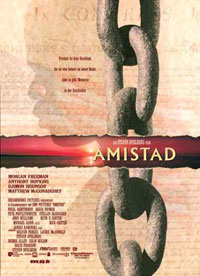 Stephen Spielberg's film Amistad was derived from Barbara Chase-Riboud's novel Echo of Lions (1988) about an African revolt on a slave ship La Amistad in 1839. Stephen Spielberg's film Amistad was derived from Barbara Chase-Riboud's novel Echo of Lions (1988) about an African revolt on a slave ship La Amistad in 1839.
Spielberg's Dreamworks in court argued that nobody owns history, therefore they had every right to use Chase-Riboud's work without permission or payment. Keep this in mind whenever you hear Spielberg or Dreamworks representatives denying they are world-class plagiarists. Their denials are not based on the idea that they don't plagiarise, but that they have a legal right to do so, or that plagiarism isn't plagiarism by their private definitions. Where Amistad was concerned Chase-Riboud had the goods on Spielberg, he was hands-down guilty. But they claimed to have that right.
Even if the argument that history can't be copyrighted ever applied to some films (overlooking that films aren't history, overloolking that films based on nonfiction works do need to be liscensed from the authors), Chase-Riboud's work was fiction & Spielberg's pretence that all the plagiarized scenes were historical was in fact incorrect & thus irrelevent
Of the many Chase-Riboud inventions was Queen Victoria's letter to President Van Buren, which letter the plagiarists mistook for an historical document despite copying it out of a work of fiction into their movie. The film script was throughout blatantly taken from the novelist.
Spielberg's team also undertook a smere campaign & upon belatedly discovering the non-fiction books Chase-Riboud used for her novel, claimed that she, rather than they, were the plagiarists. So on the one hand history is copyrighted if Chase-Riboud uses actual history, but history is not copyrighted if Spielberg plagiarises it second-hand from a novel.
Spielberg called this a "gadfly lawsuit" & swore he would "never kowtow" to such parasites. Behind the Dreamworks smoke & mirrors & smear campaign was the actual reality that Jackie Kennedy Onassis personally submitted Chase-Riboud's novel to Spielberg when it was a new book. His company turned it down, then proceeded to make a film from it.
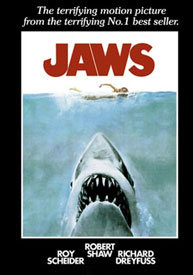 The combination of scene-for-scene stealing & the paper trail leading from Jacky O's desk to Spielberg's office made this one of the clearest cases of plagiarism of many committed by Spielberg. The combination of scene-for-scene stealing & the paper trail leading from Jacky O's desk to Spielberg's office made this one of the clearest cases of plagiarism of many committed by Spielberg.
Despite his crowing about gadflies & parasites, the only parasite was Spielberg, who well knew never to let this one get to court because even his pricey team of lawyers would get their asses cooked.
After making his creepy excuses & demeaning the actual author of a work he stole, Spielberg offered a sizeable out of court settlement, which the rightful author accepted. She should have received, in addition, a public apology & confession that the smear campaign was an evil act heaped upon Spielberg's theft.
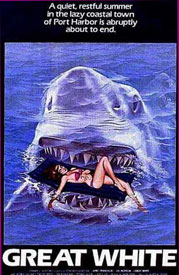 Instead, as part of the settlement, Chase-Riboud agreed to say nice things about the film in public, which is one of the standard tricks in these matters, & there have been many such turn-arounds of attitude by robbed authors who for a price ceased to be indignant. Instead, as part of the settlement, Chase-Riboud agreed to say nice things about the film in public, which is one of the standard tricks in these matters, & there have been many such turn-arounds of attitude by robbed authors who for a price ceased to be indignant.
Spielberg & his company have never used the word "settlement" in describing the case, but always say instead the case was "dropped," & to this day he claims the idea for the film originated with the producer, though he damned well knows better.
This case is a premium example of how far actual & agregious plagiarisers will go to malign the victims of such thefts, & even when they can't win their cases manage to muzzle the innocent while persisting in their own malicious lies.
It's a situation Spielberg is very often embroiled in, always making the same excuses for himself, always maligning those who were robbed & victimized. Though so powerful everyone sucks up to him face-to-face, privately he is regarded as infamous.
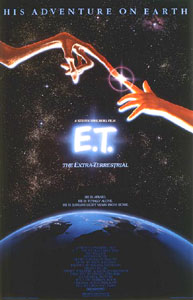 Spielberg steals even from the great. One of the greatest directors of all time was India's Satyajit Ray, who said of ET: The Extra-Terrestrial, "ET would not have been possible without my script of The Alien being available throughout America in mimeographed copies." Spielberg steals even from the great. One of the greatest directors of all time was India's Satyajit Ray, who said of ET: The Extra-Terrestrial, "ET would not have been possible without my script of The Alien being available throughout America in mimeographed copies."
Spielberg should train a parrot to speak for him, since this was one of so many times he has had to publically state his plagiarisms are original to himself.
But as Ray was something of a cinematic God, Spielberg did not dare malign him as a gadfly & parasite by projecting crimes onto Ray that were Spielberg's alone.
When dealing with "outsiders" to the Hollywood system, Spielberg is not so restrained, & may even set big guns to destroy people against whom theft was committed. To whit:
Twister has Spielberg at old tricks this time as producer, & also involving Michael Chrichton. Alas Spielberg's infamous hubris & malice found him crowing in public about how he was able to savage a wronged author, maligning him exactly as he would not long after attempt to perpetrate against Barbara Chase-Riboud, as well as others.
Twister has been identified as a plagiarism of the original screenplay Catch the Wind by Stephen Kessler. The script had been making the Los Angeles rounds for some while before the Spielberg project "borrowed" all the key scenes & went ahead with the project simultaneously with a novelization by Chrichton, without bothering to pay Kessler.
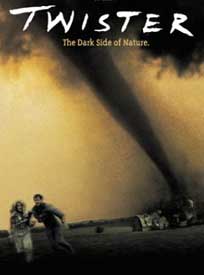 Chrichton who is credited along with his wife for the story had a great excuse: he claimed it was his wife's idea & she only plagiarized a Nova episode. Chrichton who is credited along with his wife for the story had a great excuse: he claimed it was his wife's idea & she only plagiarized a Nova episode.
But in court the story changed & he more oddly claimed the script was based on the classic comedy His Girl Friday. A comparison of his & Kessler's scripts, however, reveals not only the idea, but the character array, to be identical.
This time, fighting his already well known reputation as a plagiarist, Spielberg decided not to settle, but to send a battery of $315-an-hour attorneys to blitz Kessler in the courts. Despite that Kessler's attorney was able to show a pattern of plagiarism for both Spielberg & Chrichton (Chrichton began his writing career by pawning off a George Orwell essay as his own while at Harvard -- an incident to which he now attaches a convoluted story of testing the professor rather than personally cheating). Spielberg's own court testimony included the admission that Twister was a very bad story.
This was a from-the-witness-box slam at Kessler's lack of imagination, even while claiming never to have stolen the idea from Kessler! Not that Spielberg is wrong about how really bad his company's films can be. Twister is a foolish film that will leave no impression beyond the presence of a flying cow; nothing else in the film is the least bit interesting.
There was no clear-cut paper-trail as was the case for the theft involved with Amistad. "Ideas" cannot be copyrighted, & if a screenplay is stolen & completely rewritten, it may be morally an act of theivery, but it would be within the letter of the law. Although a judge said the parallels between the two screenplays were too many for coincidence, the case of complete plagiarism was not sufficiently proven, & Spielberg won, hence his public crowing.
Worse, the malicious Spielberg immediately launched a counter suit against Kessler claiming the suit was frivolous, even though a judge said explicitely it was not frivolous. This act was intended to reduce the original screenwriter to bankruptcy, as a warning to future plagiarised authors who might be considering a try for justice against the crimes of a rich & powerful Hollywood mogul who delights in crushing outsiders.
 When Spielberg's film was afterward "imitated" by the made-for-tv Bruce Campbell film Tornado! (1996), this revealed how nose-thumbing plagiarism is normal in Hollywood, & even Spielberg's plagiarisms get plagiarised. When Spielberg's film was afterward "imitated" by the made-for-tv Bruce Campbell film Tornado! (1996), this revealed how nose-thumbing plagiarism is normal in Hollywood, & even Spielberg's plagiarisms get plagiarised.
If the copies & thefts only get their producers in trouble ten percent of the time, they come out ahead even with attorney fees & settlement offers added in. It is rare that a look-alike film such as Tornado! brings down lawsuits, as to go up against the Fox Network would be a juggernaut war of insiders vs. insiders.
But Spielberg & Universal Studios did put an end to the American distribution of Great White (1981) after their lawsuit griped that it was "derivative" of Spielberg's Jaws (1975).
The small-time distributor was successfully bankrupted & the producer never heard from again. They were financially vulnerable, & they were outsiders, so they were not permitted to play.
It's usually only the vulnerable who get sued. "Insiders" know it is "perfectly all right" to plagiarise, & Spielberg would not go after Tornado! even though the word "Twister" was added to the ads, because Fox is an insider & is not financially vulnerable.
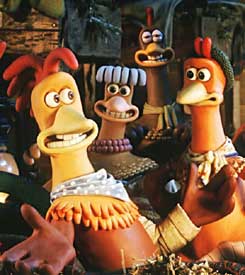 Plagiarism cases are difficult for anyone but the wealthy to launch in the courts, & difficult to win if they make it all the way to a judge, & often justice cannot be obtained for even the most overt & agregious of thefts, to whit: Plagiarism cases are difficult for anyone but the wealthy to launch in the courts, & difficult to win if they make it all the way to a judge, & often justice cannot be obtained for even the most overt & agregious of thefts, to whit:
Chicken Run was a lovely cartoon, but sadly another plagiarism for Stephen Spielberg's Dreamworks company, an uncredited "borrowing" of Alan Davidson's Escape from Cold Ditch (1995).
This charming book about a group of hens who make a daring escape from the chicken coop is an animal-retelling of actual British POWs break out of the nazi prison camp Colditz Castle. The Dreamworks film has the same plot, the same hens, the same location, even the same rooster parachuting in to help out.
The animators who got screen credit no longer claim the idea is original to them, but that it arose from conversations over dinners with Stephen Spielberg. They admit only to plagiarising The Great Escape. But it's remarkable how many of these cases have Spielberg's hand in them.
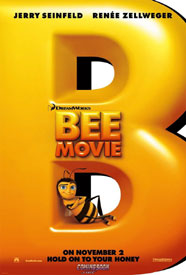 Dreamworks attorneys stalled Davidson for three years of negotiations, until the frustrated author finally filed a copyright infringement suit. Dreamworks attorneys stalled Davidson for three years of negotiations, until the frustrated author finally filed a copyright infringement suit.
Dreamworks was feeling cocky, so to speak, after getting away with plagiarism & successfully bankrupting Stephen Keller on the Twister case, & a few other claimants they railroaded right over.
In 2002, Dreamworks similarly rejected Henrik Wallgren & Per Umaerus's script for an animated film script Beebylon, ionly to begin development the next year on Bee Movie (2007).
Had it involved any production studio but Spielberg's, "coincidence" might've been credible. Dreamworks stood back from the case allowing blame to fall on Jerry Seinfeld & wife (the latter also involved in a cookbook plagiarism case, with Jerry undertaking a campaign of "humor" designed to convince the public that the author his wife copied was the equivalent of a celebrity stalker who threatened to kidnap Letterman's son).
It might've been easier to believe Dreamworks honestly rather than conveniently "forgot" they'd already read a completed script by other writers. But why is it these "coincidences" occur shortly after a similar work passes through their hands?
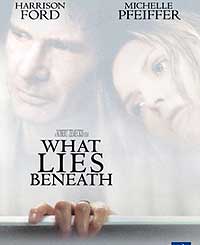 Another of Spielberg's Dreamworks plagiarisms has been alleged of What Lies Beneath (2000). South African author Peter Forde (aka Gerhard Pieter Ferreira) moved to California to shop around a script, but had no luck, though soon after, as Forde would have us believe, his story appeared as What Lies Beneath, an A-budget though mediocre ghost story featuring Michelle Pfiefer as vengeful ghost & Harrison Ford as the self-justifying cheating bastard. Another of Spielberg's Dreamworks plagiarisms has been alleged of What Lies Beneath (2000). South African author Peter Forde (aka Gerhard Pieter Ferreira) moved to California to shop around a script, but had no luck, though soon after, as Forde would have us believe, his story appeared as What Lies Beneath, an A-budget though mediocre ghost story featuring Michelle Pfiefer as vengeful ghost & Harrison Ford as the self-justifying cheating bastard.
I have read Forde's understandably angry complaints & from the way he writes his allegations, he appears to possess only a limited writing ability, & I would not expect any screenplay of his to be taken seriously as-written. But even acknowledging that his script was bound to need serious rewrites by the sorts of Hollywood hacks who specialize in reworking other peoples' works, Forde should've been paid before the revision process began. But because ideas cannot be copyrighted, even if he could prove the film originated in his amateur script, it would not be illegal to steal the idea.
If the system were fair & just, moments before Forde's amateur script began to be redeveloped professionally, he should have been paid for the idea, then scooted aside. Forde lives much too marginal an existence to launch a legal assault of thieving power-mad moguls, so he was scooted aside without payment or acknowledgement. From an attorney's point of view, since ideas cannot be copyrighted, a sufficient rewrite is all it takes for the work to be regarded as original to the rewriter.
Hollywood thieves rely on the fact that ideas cannot be copyrighted, & see how extremely they can stretch this basis for legal thefts. If you show them your idea, & they like it, & they use it, they don't have to pay you diddly, as their culpability is moral rather than legal. So someone like Gary Zambito convinced Raiders of the Lost Ark was based on his Black Rainbow, or Geoffrey Williams convinced Jurassic Park took its inspiration from his children's book about a zoo populated by cloned prehistoric animals, even if per chance it could be proven that one work led directly to the other, it might well still be legally definable as use of an uncopyrightable idea, hence a legal theft.
The Screenwriters Guild has accepted that an extensive rewrite of someone else's script can in some cases be regarded as a new work & no longer the work of the original writer, & the Guild has elaborate rules on who gets screen-credit for a finished work, rules that help weed-down what might otherwise be a multiple author credit extending to a dozen people. The Guild's most common fights are against directors who believe their revisions qualify them for exclusive author credit.
For instance, if a writer is denied credit, the Screenwriters Guild will intervene, as in the case of Paul Schraeder who felt parts of his rejected version of Close Encounters of the Third Kind had found their way into the shooting script which Spielberg preferred not to credit to the original author. Schraeder ultimately got the payment & credit that was merited, but then, he's a Hollywood insider & the great author of Taxi Driver. When it comes to Hollywood outsiders who toss their scripts into the ring only to encounter thefts, even the loosey-goosey protections afforded by the Screenwriters Guild will not be applied, & the original author is up Shitcreek with nothing but helpless anger for a paddle.
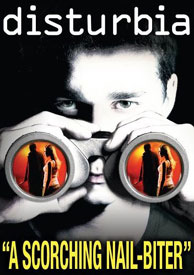 If a script is word-for-word, there's an expensive case to launch but surely win. If there's a major paper trail that connects directly between a film like Amistad & a book like Echo of Lions, there's still a pretty good case. If a script is word-for-word, there's an expensive case to launch but surely win. If there's a major paper trail that connects directly between a film like Amistad & a book like Echo of Lions, there's still a pretty good case.
If there is "substantive similarity" there may be a case but super-expensive to launch with no guarantee of winning since this is not a matter of who is right, but how much theft qualifies as legal plagiarism, a judgement-call. Since all scripts go through many revisions, substantive similarity is often all that remains, & a rich man's attorneys who deals with their client's criminality all the time will have had plenty of practice making this subjective call murkier & murkier for a judge.
The spectre of plagiarism raises its head at so many of Spielberg's projects. It could be argued that he is a man of limited imagination who deals exclusively in cliches, stories being so stupid that any asshole could think them up (which was Spielberg's own argument for Twister), therefore any number of scripts or stories could've crossed his desk containing practically the same unimaginative drivel. More often Spielberg argues that the reason he is caught & accused so very often is because he's a big target & "gadflies" & "parasites" come after his fame, which might have been a credible argument if he hadn't used the same arguments after the unquestionable theft from Chase-Riboud.
So there would appear to be a clearer reason for Spielberg being accused of the same crime again & again. The reality is that plagiarists (as analyzed by author Thomas Mallon in Stolen Words: Forays Into the Origins & Ravages of Plagiarism) are habitual & repeat offenders. So of course someone who could so blithely justify plagiarising Chase-Riboud to come up with Amistad would be repeatedly caught in habitual thefts. Mallon likens plagiarists to kleptomaniacs psychologically incapable of mending their ways.
Thus Dreamworks again ended up in court over the Spielberg production of Disturbia (2005) a direct rip-off of plot, characters, & central protagonist film Rear Window (1954) based on a story by Cornell Woolrich. Why on earth would they fail to acknowledge the source with a "story by" line of credit? Did they think if they didn't mention it was an updated remake no one would notice?
No one questions the origin of the film; scores of critics remarked upon it even before it reached the courts. But Dreamworks would have us believe it was an homage, though it was in fact an uncredited remake. Since they dug in their heals rather than apologized & made belated payment for rights, the Hitchcock estate & the Woolrich literary estate had to resort to the courts, when it could so easily have been handled fairly behind the scenes.
The important factor to bare in mind is this addition to the aresenel: uncredited outsiders may be gadflies to be squashed & bankrupted, but uncredited insiders are paid homage. Whatever the excuse, the purpose is always the same, to take credit for other peoples' work without paying the originators.
It's not all that expensive to obtain original story rights, & provide a "story by" credit apart from any script credit. But since plagiarism tends to be a pathological crime, repeat offenders fail to be self-protectiveness, & cannot fully grasp how it's cheapter to legally obtain rights than it is to truck out the same half-dozen falsehoods in court time & again.
copyright © by Paghat the Ratgirl
|
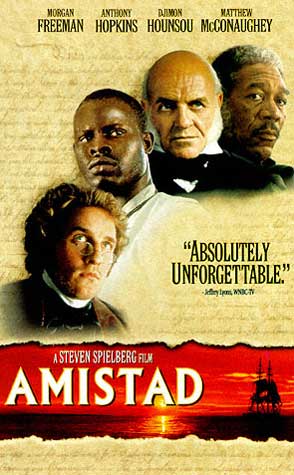


 Instead, as part of the settlement, Chase-Riboud agreed to say nice things about the film in public, which is one of the standard tricks in these matters, & there have been many such turn-arounds of attitude by robbed authors who for a price ceased to be indignant.
Instead, as part of the settlement, Chase-Riboud agreed to say nice things about the film in public, which is one of the standard tricks in these matters, & there have been many such turn-arounds of attitude by robbed authors who for a price ceased to be indignant.
 Chrichton who is credited along with his wife for the story had a great excuse: he claimed it was his wife's idea & she only plagiarized a Nova episode.
Chrichton who is credited along with his wife for the story had a great excuse: he claimed it was his wife's idea & she only plagiarized a Nova episode. When Spielberg's film was afterward "imitated" by the made-for-tv Bruce Campbell film Tornado! (1996), this revealed how nose-thumbing plagiarism is normal in Hollywood, & even Spielberg's plagiarisms get plagiarised.
When Spielberg's film was afterward "imitated" by the made-for-tv Bruce Campbell film Tornado! (1996), this revealed how nose-thumbing plagiarism is normal in Hollywood, & even Spielberg's plagiarisms get plagiarised.
 Dreamworks attorneys stalled Davidson for three years of negotiations, until the frustrated author finally filed a copyright infringement suit.
Dreamworks attorneys stalled Davidson for three years of negotiations, until the frustrated author finally filed a copyright infringement suit.
